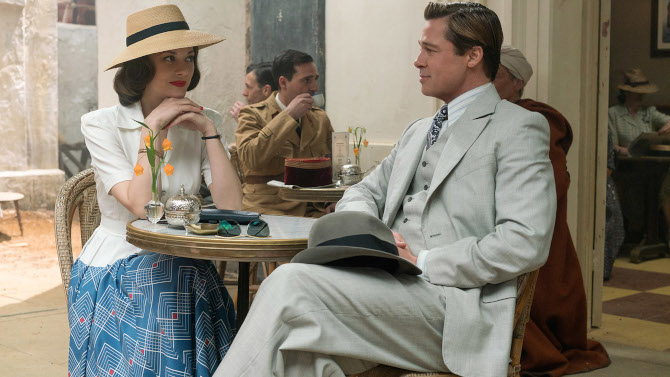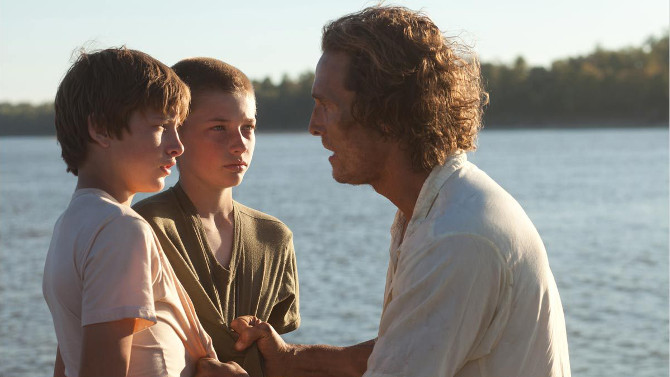
Déjà vu Dalliance
Channeling the mesmeric movies churned out by the studio system back in the 1930s and 40s, Allied (2016), directed by Robert Zemeckis, channels the likes of Morocco, Casablanca, Across the Pacific, Gilda, To Have and Have Not, and numerous others – attempting to find a spark from the classic themes of melodrama, romance, suspense and the epic nature of the annals of the cinematic past, with quite successful results. Set the year Casablanca and Across the Pacific were released – 1942, the story in fact starts in Morocco, with recently parachuted in Canadian spy Max Vatan (Brad Pitt) meeting up with another undercover agent, Marianne Beauséjour (Marion Cotillard), who will be pretending to be his wife.
-

Don’t Look a Gift Horse in the Mouth
The GiftJune 17, 2016There is nothing like receiving a present, especially when it is unexpected. It is exciting to open a perfectly wrapped box to find something that has been purchased specifically for you hiding inside. Yet, this simple concept takes a much more ominous and sinister turn in the 2015 mystery thriller, The Gift.
-

Bad Side of the Moon
MoonJune 12, 2016While watching the sci-fi mystery drama Moon, I was thinking that this was going to be it. . . the first Sam Rockwell movie I’ve seen where he does not bust into a dance routine. But alas, no, he meets his quota once again in this flick, similar to his performances in Charlie’s Angels, Iron Man 2 or The Way Way Back, to name but a few. It is not that I dislike his spontaneous groove moves, they are usually highly entertaining; it is simply something that I hawkishly look for each and every time I view a Rockwell movie – feel free to join the cause.
-

This Tarnished Gringo Shines
Get the GringoJune 5, 2016Mel Gibson may not be the most popular actor out there now, but there is no denying that he has had one of Hollywood’s more impressive careers over the last three or so decades. He puts everything he has into his work and one of his most recent films that once again impresses, yet has sadly gone unnoticed, is the 2012 crime flick Get the Gringo. Mel Gibson plays the unnamed criminal with the heart of . . .
-
Star Pick with G.J. Echternkamp
 Ship of FoolsTime BanditsMay 31, 2016
Ship of FoolsTime BanditsMay 31, 2016Hollywood studios have long used focus groups as a way to determine if audiences like a film. And, for just as long as they’ve been around, there have been complaints about them: ‘Who are the people who comprise the focus groups?’, ‘Do they have any insider movie knowledge?’, ‘Why are they more knowledgeable than the screenwriters and directors who have made the film?’, "Why are studios changing the ending of a movie just because a few random people disliked it?’.
-

Bright Hope for the Western Genre
Bone TomahawkMay 27, 2016"This is why frontier life is so difficult. Not because of the Indians or the elements, but because of the idiots." Truer words may never have been spoken about the western genre; so many of these films seem to have their share of noble idiots who are unprepared yet undaunted by a seemingly impossible task. Though motion pictures featuring cowboys, sheriffs, bandits and the like have taken a downturn over the last several decades, there has been a small resurgence of quality independent westerns that have cropped up over the past year or so. One such movie (which is where the above quotation can be found) is the 2015 horror western Bone Tomahawk.
-

Rollin’ on the River
MudMay 22, 2016Some stories feel as though they have been with us since the dawning of time. They deal with universal themes of love, coming of age, revenge and friendship. A film that feels like a modern retelling of a long since forgotten tale is the 2012 drama Mud. Clearly based upon Mark Twain’s yarns that feature Tom Sawyer and Huckleberry Finn, the plot follows modern day youths Ellis (Tye Sheridan) and Neckbone (Jacob Lofland) as they come of age on the Arkansas River (a tributary of the Mississippi).

